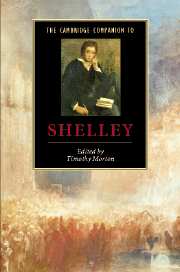2 - Receptions
from Part I - Lives and afterlives
Published online by Cambridge University Press: 28 January 2007
Summary
My brother Shelley [mein Bruder Shelley]
(Bertolt Brecht, ‘On Thinking about Hell’, in Hollywoodelegien)Poetry only exists in readings. Poets are to some extent the first readers of their own works. Since mechanical reproduction - since, that is, the invention of the printing press - and especially since the advent of copyright laws, poetry has detached from its authors and wandered somewhat freely in public space. Romantic poets were acutely aware of their afterlives, and their works reflect this. Shelley talked about afterlife in many of his works, meditating upon the very process I am describing. In Queen Mab, death and sleep are 'wonderful' (1.1) because of their suspension of daily routines and habitual patterns; they allow the possibility for thinking about how things could be otherwise. Imagining your own death is necessarily about stepping outside the normal framework of life. In Alastor, we get to glimpse poetry going on after the death of the Poet protagonist, as great swathes of blank verse writhe around his corpse. The gigantic images in Prometheus Unbound and The Triumph of Life, too complex and sinuously vast to take in at once, appear to keep unfurling even while we are not reading them. This is not unrelated to Shelley the political disseminator, placer of messages into bottles and balloons, floater of propaganda across waters, maker of paper boats, the one who wrote about the 'Ashes and sparks' of his writing being swept along by the west wind of history to 'quicken a new birth' ('Ode to the West Wind', 67, 64). It is fitting that, almost two centuries after his death, the Liberal - the journal that he started with Leigh Hunt and Byron - has gained a new lease of life. Shelley made the idea of poetic afterlife the climax of his Defence of Poetry. Poets are 'the unacknowledged legislators of the world' (Pr 297). If 'unacknowledged' means 'unconscious', then even while their writers are alive poems are doing their work outside and beyond the scope of their authors.
- Type
- Chapter
- Information
- The Cambridge Companion to Shelley , pp. 35 - 42Publisher: Cambridge University PressPrint publication year: 2006
- 3
- Cited by

